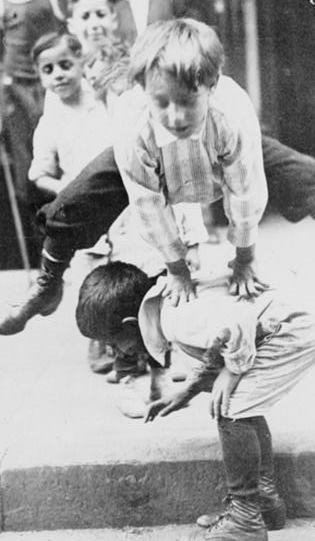A question from a reader:
" ..I guess that spontaneous sense of community that happens in suburbia – or lack thereof – is one of the biggest fears of moving downtown. Does that make any sense? In other words- is there a large enough group downtown to just bump into each other and hang out, or does it need to be more proactively planned?"
For adults, this is an easy question. The city offers tons more opportunity to just bump into people. We can hardly walk a block without bumping into someone we know at least as aquaintances. This often results in coffee or at least a short conversation. The need for planning get-togethers is more a function of everyone being so busy all the time with their work family juggle, and this is a nationwide problem, not just one that downtowners have.
However, for kids, and their unstructured vs structured playtime, the question revolves around the child's "roam space". See a previous post on how kids Roam Space is shrinking. First of all, yes there are lots of kids around. The question is, are they appropriate playmates for your kid without supervision?
Kids do spontaneously get together and play sometimes. We will hang out at the playground for example and meet new kids. My son keeps running into some kid named Anthony, and they immediately get into wrestling and chasing. His grandparents own a store on Walnut and he attends the same school as my son, and they can play anywhere we bump into them, whether the sidewalk or the library. The other chance for spur of the moment play is if other kids of similar ages live in the same building. Fortunately, we do have that situation for my daughter and a neighbor boy.
I think the advantage of the suburb that the reader is thinking about essentially has to do with the safety and relative homogeneity of a neighborhood, which would allow a parent to let the kids roam, and find their own play in the cul-de-sac or amongst the backyards. I think that the cul-de-sac and the yard are less essential in this equation than is the guarantee that the neighbors are child friendly and if the kids they meet are up to your standards.
For example; if on your quiet residential street, the kids all play together after school and the parents do not have to watch their every move, you have a relaxed and peaceful spontaneous play time community. But if you have that same street but one house has drug dealers (as is the case with some suburban friends of mine) then a responsible parent will not allow the kids to go out playing spontaneously.
In the city, we cannot get a homogeneous sidewalk or park, nor do we want it. We do not know who just moved in up the block. However, in a successful city, there is an inherent safety that occurs with the varied number of people out and about.
I would like to make a point here: Safety is found in numbers. Many contemporary Americans are uncomfortable with this idea and prefer safety in isolation, as in a private backyard. However, safety is indeed found in numbers for the simple reason that a great majority of people are trustworthy and responsible citizens. Empty city streets are inherently more dangerous than crowded ones for this sole reason.
I am very confident that if my child was in danger, many neighbors would rush to the rescue. In fact I have seen this in evidence many times. A few weeks ago, for example, my son crashed his bike in the park when I was maybe 30 yards away. Two somewhat ragged men stopped and asked my son if he was alright and helped him with his bike before I could get there. This kind of thing happens all the time, even in the poorest neighborhoods. It takes a faith in mankind to live in a city, but you must remember that a crowd of good Samaritans keeps the bad eggs in check. The problem in many American cities is finding any kind of crowd at all.
There will come a time, and I am not sure what the age will be, when my son will go to the pool or the corner store on his own. What age do parents in the suburbs allow this to occur now? In the 70's I left the sight of my parents for hours on end at age 10. Do parents still allow that? Is it even allowed by law? I really don't know.
Obviously kid's lives are much more structured than they were when we were growing up. This is true if you live in the suburbs or the city. Between work, school, homework, sports, scouts, music lessons, etc etc, when do kids get to just play anymore?
20 December 2007
Subscribe to:
Post Comments (Atom)







No comments:
Post a Comment